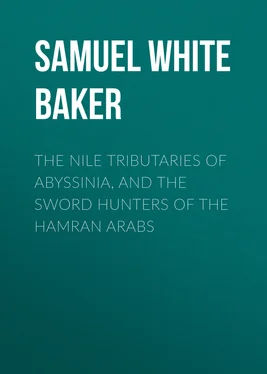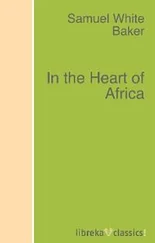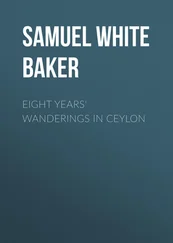Samuel White Baker - The Nile Tributaries of Abyssinia, and the Sword Hunters of the Hamran Arabs
Здесь есть возможность читать онлайн «Samuel White Baker - The Nile Tributaries of Abyssinia, and the Sword Hunters of the Hamran Arabs» — ознакомительный отрывок электронной книги совершенно бесплатно, а после прочтения отрывка купить полную версию. В некоторых случаях можно слушать аудио, скачать через торрент в формате fb2 и присутствует краткое содержание. Жанр: Путешествия и география, История, foreign_edu, foreign_antique, foreign_prose, на английском языке. Описание произведения, (предисловие) а так же отзывы посетителей доступны на портале библиотеки ЛибКат.
- Название:The Nile Tributaries of Abyssinia, and the Sword Hunters of the Hamran Arabs
- Автор:
- Жанр:
- Год:неизвестен
- ISBN:нет данных
- Рейтинг книги:3 / 5. Голосов: 1
-
Избранное:Добавить в избранное
- Отзывы:
-
Ваша оценка:
- 60
- 1
- 2
- 3
- 4
- 5
The Nile Tributaries of Abyssinia, and the Sword Hunters of the Hamran Arabs: краткое содержание, описание и аннотация
Предлагаем к чтению аннотацию, описание, краткое содержание или предисловие (зависит от того, что написал сам автор книги «The Nile Tributaries of Abyssinia, and the Sword Hunters of the Hamran Arabs»). Если вы не нашли необходимую информацию о книге — напишите в комментариях, мы постараемся отыскать её.
The Nile Tributaries of Abyssinia, and the Sword Hunters of the Hamran Arabs — читать онлайн ознакомительный отрывок
Ниже представлен текст книги, разбитый по страницам. Система сохранения места последней прочитанной страницы, позволяет с удобством читать онлайн бесплатно книгу «The Nile Tributaries of Abyssinia, and the Sword Hunters of the Hamran Arabs», без необходимости каждый раз заново искать на чём Вы остановились. Поставьте закладку, и сможете в любой момент перейти на страницу, на которой закончили чтение.
Интервал:
Закладка:
Berber is a large town, and in appearance is similar to the Nile towns of Lower Egypt, consisting of the usual dusty, unpaved streets, and flat-roofed houses of sun-baked bricks. It is the seat of a Governor, or Mudir, and is generally the quarters for about 1,500 troops. We were very kindly received by Halleem Effendi, the ex-Governor, who at once gave us permission to pitch the tents in his garden, close to the Nile, on the southern outskirt of the town. After fifteen days of desert marching, the sight of a well-cultivated garden was an Eden in our eyes. About eight acres of land, on the margin of the river, were thickly planted with lofty date groves, and shady citron and lemon trees, beneath which we revelled in luxury on our Persian rugs, and enjoyed complete rest after the fatigue of our long journey. Countless birds were chirping and singing in the trees above us; innumerable ring-doves were cooing in the shady palms; and the sudden change from the dead sterility of the desert to the scene of verdure and of life, produced an extraordinary effect upon the spirits. What caused this curious transition? Why should this charming oasis, teeming with vegetation and with life, be found in the yellow, sandy desert? . . . Water had worked this change; the spirit of the Nile, more potent than any genii of the Arabian fables, had transformed the desert into a fruitful garden. Halleem Effendi, the former Governor, had, many years ago, planted this garden, irrigated by numerous water-wheels; and we now enjoyed the fruits, and thanked Heaven for its greatest blessings in that burning land, shade and cool water.
The tents were soon arranged, the camels were paid for and discharged, and in the cool of the evening we were visited by the Governor and suite.
The firman having been officially presented by the dragoman upon our arrival in the morning, the Governor had called with much civility to inquire into our projects and to offer assistance. We were shortly seated on carpets outside the tent, and after pipes and coffee, and the usual preliminary compliments, my dragoman explained, that the main object of our journey was to search for the sources of the Nile, or, as he described it, "the head of the river."
Both the Governor and Halleem Effendi, with many officers who had accompanied them, were Turks; but, in spite of the gravity and solidity for which the Turk is renowned, their faces relaxed into a variety of expressions at this (to them) absurd announcement. "The head of the Nile!" they exclaimed, "impossible!" "Do they know where it is?" inquired the Governor, of the dragoman; and upon an explanation being given, that, as we did not know where it was, we had proposed to discover it, the Turks merely shook their heads, sipped their coffee, and took extra whiffs at their long pipes, until at length the white- haired old Halleem Effendi spoke. He gave good and parental advice, as follows:—
"Don't go upon so absurd an errand; nobody knows anything about the Nile, neither will any one discover its source. We do not even know the source of the Atbara; how should we know the source of the great Nile. A great portion of the Atbara flows through the Pasha of Egypt's dominions; the firman in your possession with his signature, will insure you respect, so long as you remain within his territory; but if you cross his frontier, you will be in the hands of savages. The White Nile is the country of the negroes; wild, ferocious races who have neither knowledge of God nor respect for the Pasha, and you must travel with a powerful armed force; the climate is deadly; how could you penetrate such a region to search for what is useless even should you attain it? But how would it be possible for a lady, young and delicate, to endure what would kill the strongest man? Travel along the Atbara river into the Taka country, there is much to be seen that is unexplored; but give up the mad scheme of the Nile source."
There was some sense in old Halleem Effendi's advice; it was the cool and cautious wisdom of old age, but as I was not so elderly, I took it "cum grano salis." He was a charming old gentleman, the perfect beau ideal of the true old style of Turk, but few specimens of which remain; all that he had said was spoken in sincerity, and I resolved to collect as much information as possible from the grey-headed authorities before I should commence the expedition. I was deeply impressed with one fact, that until I could dispense with an interpreter it would be impossible to succeed, therefore I determined to learn Arabic as speedily as possible.
A week's rest in the garden of Halleem Effendi prepared us for the journey. I resolved to explore the Atbara river and the Abyssinian affluents, prior to commencing the White Nile voyage. The Governor promised me two Turkish soldiers as attendants, and I arranged to send my heavy baggage by boat to Khartoum, and secure the advantage of travelling light; a comfort that no one can appreciate who has not felt the daily delay in loading a long string of camels. Both my wife and I had suffered from a short attack of fever brought on by the prostrating effect of the simoom, which at this season (June) was at its height. The Nile was slowly rising, although it was still low; occasionally it fell about eighteen inches in one night, but again rose; this proved that, although the rains had commenced, they were not constant, as the steady and rapid increase of the river had not taken place. The authorities assured me that the Blue Nile was now rising at Khartoum, which accounted for the increase of the river at Berber.
The garden of Halleem Effendi was attended by a number of fine powerful slaves from the White Nile, whose stout frames and glossy skins were undeniable witnesses of their master's care. A charmingly pretty slave girl paid us daily visits, with presents of fruit from her kind master and numerous mistresses, who, with the usual Turkish compliments as a preliminary message, requested permission to visit the English lady.
In the cool hour of evening a bevy of ladies approached through the dark groves of citron trees, so gaily dressed in silks of the brightest dyes of yellow, blue, and scarlet, that no bouquet of flowers could have been more gaudy. They were attended by numerous slaves, and the head servant politely requested me to withdraw during the interview. Thus turned out of my tent, I was compelled to patience and solitude beneath a neighbouring date palm.
The result of the interview with my wife was most satisfactory; the usual womanish questions had been replied to, and hosts of compliments exchanged. We were then rich in all kinds of European trifles that excited their curiosity, and a few little presents established so great an amount of confidence that they gave the individual history of each member of the family from childhood, that would have filled a column of the Times with births, deaths, and marriages.
Some of these ladies were very young and pretty, and of course exercised a certain influence over their husbands; thus, on the following morning, we were inundated with visitors, as the male members of the family came to thank us for the manner in which their ladies had been received; and fruit, flowers, and the general produce of the garden were presented to us in profusion. However pleasant, there were drawbacks to our garden of Eden; there was dust in our Paradise; not the dust that we see in Europe upon unwatered roads, that simply fills the eyes, but sudden clouds raised by whirlwinds in the desert which fairly choked the ears and nostrils when thus attacked. June is the season when these phenomena are most prevalent. At that time the rains have commenced in the south, and are extending towards the north; the cold and heavy air of the southern rain-clouds sweeps down upon the overheated atmosphere of the desert, and produces sudden violent squalls and whirlwinds when least expected, as at that time the sky is cloudless.
Читать дальшеИнтервал:
Закладка:
Похожие книги на «The Nile Tributaries of Abyssinia, and the Sword Hunters of the Hamran Arabs»
Представляем Вашему вниманию похожие книги на «The Nile Tributaries of Abyssinia, and the Sword Hunters of the Hamran Arabs» списком для выбора. Мы отобрали схожую по названию и смыслу литературу в надежде предоставить читателям больше вариантов отыскать новые, интересные, ещё непрочитанные произведения.
Обсуждение, отзывы о книге «The Nile Tributaries of Abyssinia, and the Sword Hunters of the Hamran Arabs» и просто собственные мнения читателей. Оставьте ваши комментарии, напишите, что Вы думаете о произведении, его смысле или главных героях. Укажите что конкретно понравилось, а что нет, и почему Вы так считаете.












